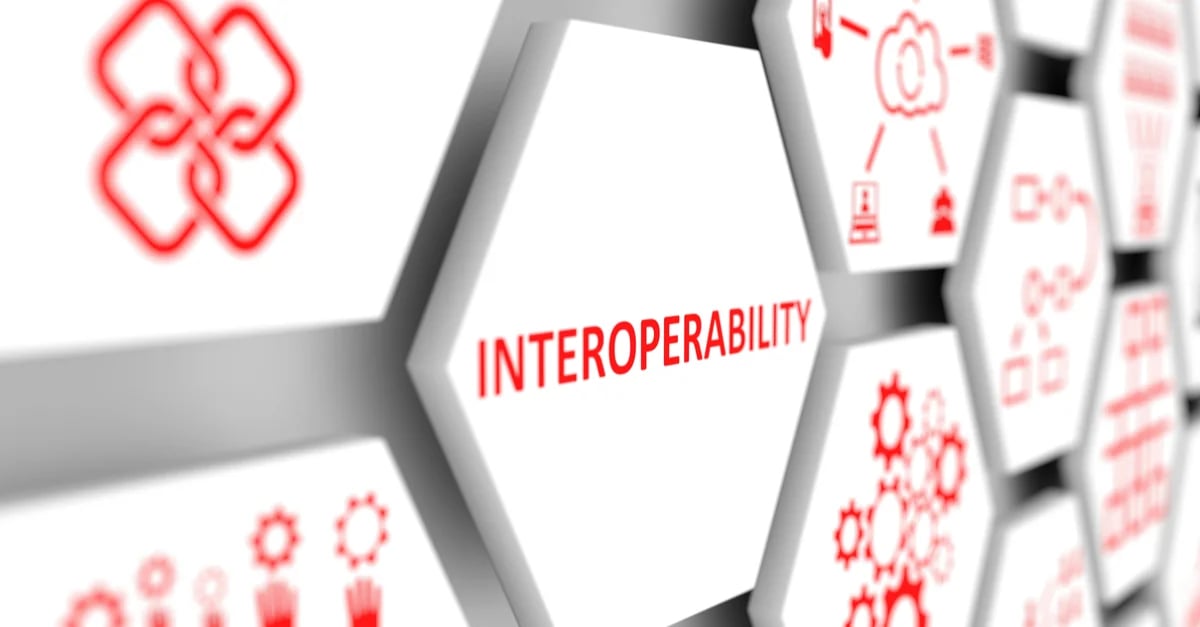Interoperability in healthcare and care settings is fundamental to improved medications management

Realising the potential of interoperability not just between different products within a system but also more widely between different parts of the journey of care is one of the most crucial goals of improving the outcomes of care for residents. So, today we’re discussing interoperability in healthcare and care settings, examples of interoperability, and why it’s so important.
What is interoperability?
Broadly, when set in the context of health and social care, interoperability according to NHS England is defined as “the capability for people involved in the provision and receipt of care to interact and complete a task across software and organisational boundaries; and use equipment, systems, or products from different vendors, which operate together in a coordinated fashion, with minimal to no human intervention.”
As digital tools have evolved over the last ten years, interoperability has been improved in health and social care as data is now available across different systems and across different products within a broader hub of tools, like those in Person Centred Software’s Connected Care Platform, and this is crucial because it means that time that would otherwise have been spent either gathering information or inputting the same information into multiple systems can otherwise be spent on more essential tasks, whether that is more time for clinical care or for quality time to be spent with residents.
Moreover, improved interoperability has meant that the mistakes that are all-too easy to make, such as miscommunications or a delay in information exchanges between, for example, GPs and care settings or care settings and pharmacies, or even human errors like illegible handwriting, can be more easily avoided.
The role of interoperability in medicines management
Ensuring that the right resident gets the right dose at the right time is the central goal of any medications management system. Indeed, a medication management system, for example like ATLAS eMAR, is built on the premise of interoperability because it enables users of the system to share information to other products or serves or receive updated information from them, like a digital care planning system or to pharmacies.
ATLAS eMAR is designed to improve the lives of residents by ensuring that they are always getting the correct medications required, that these needs are updated in real time, and issues like administering unnecessary medications can be avoided. When monitoring medications, ATLAS eMAR acts as the link between care homes and pharmacies, and also because it is integrated with mCare, Person Centred Software’s digital care planning system, ATLAS eMAR’s medication information can feed through to mCare’s GP Connect feature, which ensures a completely connected system of information sharing for all health and care settings.
That is why interoperability – the process of information sharing between, for example, the users of ATLAS eMAR and a care home’s chosen pharmacy, is so important. In this example, if after a medicines review, a GP determines that the medication of a resident needs to be altered, that information coming through to the pharmacy in the form of a prescription might be delayed if information is not available to share in real time. As a result, the care home staff might be unknowingly administering medication to residents that is no longer necessary or worse still, may have a detrimental effect on their health and wellbeing. Without interoperability in medications management, this scenario is harder to avoid.
For staff, it also means that they do not have to waste needless time booking in medication with a paper-based system, which takes far longer and is far more prone to error than with ATLAS eMAR, and while medication round will take the same amount of time as before, the accuracy level of the medications administered is guaranteed to be higher. This is down to the barcode validation process during the administration round that acts as an important safeguard against errors. It means they have a far greater amount of control of stock and, on a human level, the enormous responsibility of overseeing a resident’s medication needs and the potential mistakes that can have significant consequences are alleviated to the degree that is possible because care staff are confident that the information they are relying on to ensure accurate medication administration is indeed itself as accurate as possible.
How interoperable systems help with the transfer of data between care settings
Interoperability, when fully realised, extends beyond the care home itself. Indeed, it extends beyond the pharmacy and the GP. Traditionally, when residents would go into a hospital setting or when they would return to a care setting from the hospital, ensuring that medication information is as up to date as possible was always a challenge because it relied on paper copies beyond sourced, which themselves could well be out of date.
But with a fully integrated system that allows for the seamless transfer of medication information, care staff can use the medication information from ATLAS eMAR, that can then be inputted into the digital care planning system, mCare, to produce an eRedBag for hospital admissions. With this, a digital version of the paper documents included in the Red Bag can be as up to date as possible to ensure that everybody involved in the provision of care for residents, whether they are inside or outside the care home itself, can act based upon the most up to date information possible.
Improved medications management with ATLAS eMAR
Interoperability in healthcare and care settings is the way that anyone involved in the provision of care for the most vulnerable members of society can be confident that they are providing the best outcomes possible – many of the mistakes made in the past that were often put down to miscommunication or a lack of up to date information can be avoided with a truly interoperable system.
ATLAS eMAR provides this platform for seamless and secure data sharing between different health and social care settings to ensure that the right resident always receives the right dose at the right time. To find out more about how ATLAS eMAR can transform your medications management process, why not book a demo by clicking the button below.


